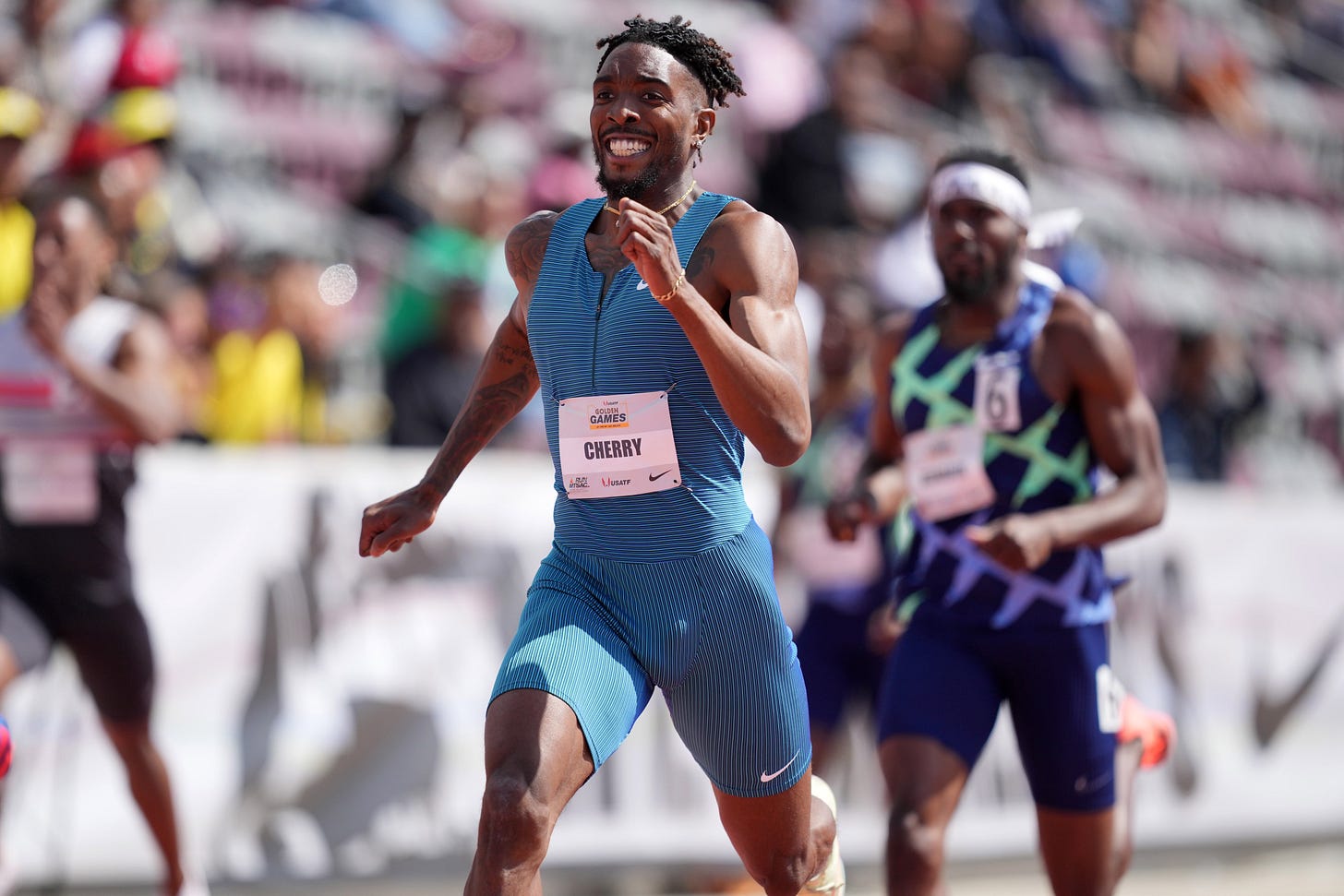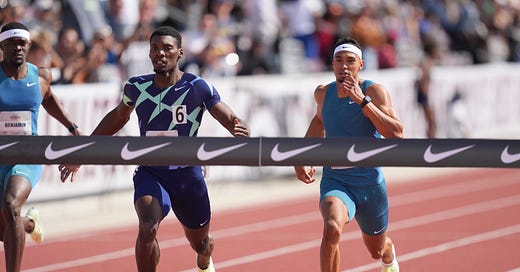Kerley's versatility continues to shine
Olympic silver medalist in 100 outduels Norman in 200 at Mt. SAC Relays

The 100 is the start. The 400 you just go. But the 200, you gotta have just right.
So said Fred Kerley after coming from behind to win the men’s 200 meters in 19.80 seconds on Saturday on the final day of the Mt. San Antonio College Relays at Hilmer Lodge Stadium.
Kerley’s performance, which turned back fast-starting Michael Norman by three hundredths of a second, was the fastest time in the world this year.
Kerley and Norman are two of the most versatile sprinters in the world, based on their personal bests in the 100, 200 and 400, as well as their history of excelling in all three events at the world-class level.
Norman, who placed fifth in the 400 in the Olympic Games in Tokyo, got out of the blocks well and had a clear lead on Olympic 100 silver medalist Kerley 75 meters into the race. However, Kerley did not yield any more ground over the next 25 meters and was within striking distance of Norman coming off the turn.
Kerley, who has bests of 9.84 in the 100, 19.76 in the 200, and 43.64 in the 400, began to eat into Norman’s lead with 60 meters left in the race, caught him with 40 to go, and gradually inched in front of him over the final 30 meters of the race.
“I feel like I’m still learning to run the curve properly,” Kerley said. “I feel like the 100 and the 400, I got those down. But the 200, you have to get the curve just right. I’m still working on that.”
Prior to last year, Kerley was best known for his exploits in the 400, the event in which he won a bronze medal in the 2019 Word Championships in Doha, Oatar. But he raised some eyebrows in the track and field world when he chose to run in the 100 and 200, and not the 400, in the U.S. Olympic Trials.
The chorus of people questioning that decision got louder after he finished third in the 100 and fourth in the 200 in the Trials. But he bounced back to finish second behind Marcell Jacobs of Italy in the 100 in Tokyo and won several big races in the 100 and 200 in high-profile meets after the Games.
“I thought I was going to go faster,” he said about his performance Saturday. “But the ultimate thing about running right now is the W.”
Kerley said he has yet to make a decision about what race or races he will contest in the USA Track and Field Championships from June 26-29. That meet will serve as the qualifying meet for the U.S. team that will compete in the World Championships in Eugene, Oregon, on July 15-24.
Kerley did say that his next race will be a 100 in the Kip Keino Classic in Nairobi on May 7, his 27th birthday.
“I want to run fast there,” he said.
Based on the Nairobi’s elevation of nearly 5,900 feet above sea level, a fast time should be very possible.
Michael Cherry is a big fan of Kerley.
The fourth-place finisher in the men’s 400 in the Olympics marvels at Kerley’s versatility, but figures he will move up to the 800 before he ever tries to move down to the 200 or 100.
He ran his specialty extremely well on Saturday, as his 44.28 clocking was the fastest in the world this year, and the third fastest of his career.
It was doubly impressive as it came in his opening race of the outdoor season.
Kenny Bednarek, Olympic silver medalist in the 200, led the field coming down the backstretch of the 400 and still had the lead entering the home straightaway. But Cherry had begun to make up ground on him midway through the second turn and moved past him with 80 meters left.
Alison dos Santos of Brazil, bronze medalist in the 400 intermediate hurdles in Tokyo, closed a little on Cherry in the last 40 meters of the race while finishing second in 44.54. Bednarek was fourth in 45.37.
“I thought the time was pretty impressive,” Cherry said. “It’s my fastest opener ever. Last year I ran 45.9 in my opener so this is a huge jump.”

There were several other notable performances in the Golden Games portion of the meet.
Micah Williams of the University of Oregon won the men’s 100 in a wind-aided 9.83 to defeat second-place Brandon Carnes by a tenth of a second.
Twanisha Terry won the women’s 100 in a wind-aided 10.77 to turn back Aleia Hobbs (10.80), Gabby Thomas (10.86) and Teahna Daniels (10.91).
Elaine Thompson-Herah of Jamaica, winner of the women’s 100 and 200 in the last two Olympics, posted the fastest time in the prelims with a 10.89 clocking, but did not run in the final.
Thomas, bronze medalist in the 200 in Tokyo, followed her third-place finish in the 100 by winning the 200 in 22.02. The race was run approximately 15 minutes after the 100.
Tonea Marshall ran 12.46 to upset Olympic silver medalist Keni Harrison (12.56) in the final of the women’s 100 hurdles after Harrison led qualifying with a wind-aided time of 12.42.
Olympic bronze medalist Raevyn Rogers won the women’s 800 in 1:58.77, the second fastest outdoor time in the world this year. Lindsey Butterworth of Canada, sixth in the World Athletics Indoor Championships in March, placed second in 2:00.40.
Valarie Allman won the women’s discus with a throw of 69.46 meters (227 feet 10 inches).
The Olympic champion, who had raised her own U.S. record to 71.46 (234-5) at the Triton Invitational at UC San Diego on April 8, had throws of 66.88 (219-5), 67.09 (220-1) and 66.60 (218-6) on Saturday before unleashing her best effort in the fourth round.
The men’s discus was won by Olympic champion Daniel Stahl of Sweden, who had a best throw of 67.65 (221-11). Freshman Mykolas Alekna of Cal Berkeley placed second with a best of 218-6.
Alekna is the son of Lithuania’s two-time Olympic champion Virgilijus Alekna.
In the women’s 1,600-meter relay, a team of Shamier Little, Allyson Felix, Dalilah Muhammad and Athing Mu placed first in 3:25.35.
Felix, who has won a combined 27 medals in the Olympic Games or World Championships, announced on Wednesday – via Instagram – that this will be her final season.



